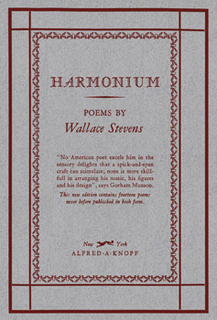Related Research Articles

Wallace Stevens was an American modernist poet. He was born in Reading, Pennsylvania, educated at Harvard and then New York Law School, and spent most of his life working as an executive for an insurance company in Hartford, Connecticut. He won the Pulitzer Prize for Poetry for his Collected Poems in 1955.

Harmonium is a book of poetry by American poet Wallace Stevens. His first book at the age of forty-four, it was published in 1923 by Knopf in an edition of 1500 copies. This collection comprises 85 poems, ranging in length from just a few lines to several hundred. Harmonium was reissued in 1931 with three poems omitted and fourteen new poems added.
"Le Monocle de Mon Oncle" is a poem from Wallace Stevens's first book of poetry, Harmonium. It was first published in 1918.
"Ploughing on Sunday" is a poem from Wallace Stevens's first book of poetry, Harmonium (1923). First published in 1919, it is now in the public domain.
"The Doctor of Geneva" is a poem from Wallace Stevens's first book of poetry, Harmonium (1923). The poem was first published in 1921, so it is free of copyright.
"From the Misery of Don Joost" is a poem from Wallace Stevens's first book of poetry, Harmonium. It is in the public domain, having been published in the journal Poetry in 1921.
"O Florida, Venereal Soil" is a poem from Wallace Stevens's first book of poetry, Harmonium. It was first published in the journal Dial, volume 73, July 1922, and is therefore in the public domain.
"Valley Candle" is a poem from Wallace Stevens's first book of poetry, Harmonium. It is in the public domain according to Librivox, having been first published prior to the 1923 publication year of Harmonium.
"The Apostrophe to Vincentine" is a poem from Wallace Stevens's first book of poetry, Harmonium (1923). It was first published before 1923 and is therefore in the public domain according to Librivox.
"Of Heaven Considered as a Tomb" is a poem from Wallace Stevens's first book of poetry, Harmonium (1923). It was first published in 1921, so it is in the public domain.
"Of the Surface of Things" is a poem from Wallace Stevens's first book of poetry, Harmonium (1923). It was first published in 1919, so it is in the public domain.
"Anecdote of the Prince of Peacocks" is a poem from Wallace Stevens's first book of poetry, Harmonium (1923). It was one of the few Harmonium poems first published in that volume, so it is still under copyright. However, it is quoted here as justified by Fair use to facilitate scholarly commentary.
"Depression Before Spring" is a poem from Wallace Stevens's first book of poetry, Harmonium (1923). It was first published in 1918 and is therefore in the public domain.
"Tea at the Palaz of Hoon" is a poem from Wallace Stevens's first book of poetry, Harmonium. It was first published in 1921, so it is in the public domain.
"Cortege for Rosenbloom" is a poem from Wallace Stevens's first book, Harmonium. First published in 1921, it is in the public domain in the United States and similar jurisdictions.
"Thirteen Ways of Looking at a Blackbird" is a poem from Wallace Stevens's first book of poetry, Harmonium. The poem consists of thirteen short, separate sections, each of which mentions blackbirds in some way. Although inspired by haiku, none of the sections meets the traditional definition of haiku. It was first published in October 1917 by Alfred Kreymborg in Others: An Anthology of the New Verse and two months later in the December issue of Others: A Magazine of the New Verse.
"Hymn From A Watermelon Pavilion" is a poem from Wallace Stevens's first book of poetry, Harmonium. It was first published in 1917, so it is in the public domain.
"The Death of a Soldier" is a poem from Wallace Stevens's first book of poetry, Harmonium. The poem uses free verse to describe the death of a soldier.
"The Public Square" is a poem from the second edition (1931) of Wallace Stevens's first book of poetry, Harmonium. It was first published in 1923, so it is one of the few poems in the collection that is not free of copyright, but it is quoted here in full as justified by fair use for scholarly commentary.
Frank Aristides Doggett was an educator in the Duval County, Florida school system and an independent scholar who was an early authority on the American Modernist poet, Wallace Stevens. Doggett was born in Jacksonville, Florida, earned a bachelor's degree at Rollins College in Winter Park, Florida and his master's degree at Emory University. He received an honorary doctorate of letters from the University of Florida in 1967 for his contributions toward the understanding of Stevens' work.
References
- Frank Doggett, Wallace Stevens: The Making of the Poem. 1980: Johns Hopkins University Press.